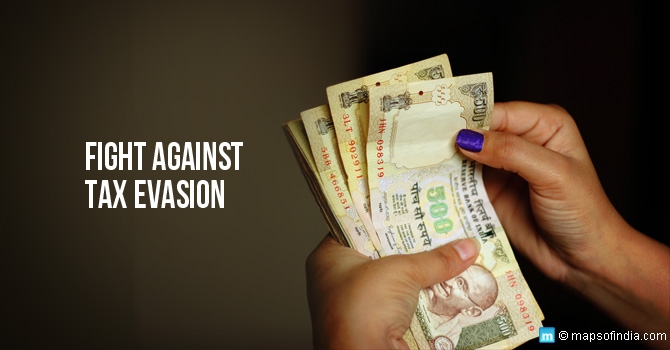The fight against tax evasion is beginning to pay rich dividends for the government.
According to a statement released by the Finance Ministry on 10 May, the government’s sustained measures at unearthing black money has led to uncovering of Rs. 50,000 crore in indirect tax evasion, in addition to identifying Rs. 21,000 crore in undisclosed income, over the past two years.
The statement also revealed that smuggled goods worth Rs. 3,963 crore had been seized by various government agencies and marked a 32% increase over what was achieved between 2012-14.
The NDA regime came into power on the back of its promise to detect and bring back black money stashed abroad within a short span. Although the government has not been very successful in its promised endeavor, it has been quite successful in detecting significant amount of tax evading money circulating within the country.
Rs. 71,000 crore is by no means small change and is the result of several agencies working in tandem under the supervision of a proactive finance ministry that made this detection possible.
Extent of the Problem
The extent of the problem can be gauged by the fact that in December 2014, the then SIT had reported to the courts that as per Global Financial Integrity (GFI) report, India ranked 142 for illegal money flow. It further stated that in 2012 alone, illegal money flow touched Rs. 5,93,557 crore and the cumulative total for the past 10 years stood at Rs 25,00,000 crore.
In 2013-14, the Central Bureau of Direct Taxes (CBDT) reported detection of Rs. 7,078 crore of undisclosed income and Rs. 4,456.96 crore for the period April 2014-Feb 2015.
The problem continues to be widespread, and as per a FICCI report, cricket betting in India generates over Rs. 3 lakh crore in black money. Central and respective state elections is another period where large amounts of black money stands circulated.
Action Taken
One of the most effective steps the government has taken to fight the growing menace of domestic black money has been to push for the enactment of the Black Money Act. The act has added more teeth with new income disclosure norms being made mandatory. It ensured harsher penalties for violations.
In addition, the government also set up a special investigation team (SIT) under the supervision of former Supreme Court Judge MB Shah, to investigate tax evasion cases. In the last two years, the government has initiated 1,466 prosecution cases against violators which marks a 25% increase over 1,169 cases registered between 2012-14.
In order to encourage self-disclosure as against the prosecution route, Finance Minister Arun Jaitley, in his budget speech this year, had announced a four-month window (starting 1 June) for defaulters to come forward and declare their undisclosed assets and income in India, and avoid legal action by paying 30% tax, along with 7.5% penalty and 7.5% surcharge. The government stands hopeful of a positive response to this offer, given the new laws will come down hard on defaulters.
In 2015, the government had announced a similar window for three months that ended in September 2015, for those holding undisclosed assets and income overseas. During that period, the government managed to collect Rs. 2,500 crore in net tax against a total of Rs. 4,147 crore of undeclared assets abroad.
Better coordination between agencies paying rich dividends
The Financial Intelligence Unit (FIU), along with agencies such as the Enforcement Directorate, Income and Service Tax departments, and Customs, has been chasing suspicious transactions involving not just black money but other suspicious transactions, through Suspicious Transaction Report (STR), Cash Transaction Report (CTR), Counterfeit Currency Report (CCR) and Non-Profit Organization Transaction Report (NTR).
STRs are commercial transactions that are suspected to fund criminal and terrorist activities. CCR are connected commercial transactions through banking or other channels and above Rs. 10 lakh in value. These are tracked for suspicious activity and tax evasion. While CTR pertains to fake money transaction and circulation, NTR is related to submission of transactions connected to funding of NGOs.
Concerted efforts of the FIU on money laundering activity is reflected through 61,953 STR dossiers being collected in 2013-14 as against 31,731 STR dossiers tracked in 2012-13.
Furthermore, FIU received 3,01,804 CCRs, 87,79,082 CTRs and 80,616 NTRs. They were being acted upon. To further strengthen FIU, the SIT appointed under Justice MB Shah has recommended to the central government to include tracking of criminal funding transactions as part of their mandate, in addition to the usual tracking of black money.
SEBI sharpens focus on black money in stock markets
Securities and Exchange Board of India (SEBI), too, has sharpened its teeth through close monitoring of suspicious transactions in stock trading. Its efforts have borne positive results with several entities being detected which have been using stock markets to convert black money into white.
By mid-2015, SEBI had already detected and taken action by banning 900 entities that were involved in channelizing black money into the stock market. In many cases, it was detected that the same group of persons were behind artificial raising of stock prices of companies that could not justify the same, as there was no apparent growth in turnover, sales or revenue in these suspect companies.
The estimated tax evasion was said to be to the tune of Rs. 5,000-6,000 crore. SEBI’s proactive approach has resulted in choking this flow of black money to a great extent.
Black money still doing rounds in several sectors
The government has done a fine job in moving aggressively towards detecting direct and indirect tax evasion in commercial transactions but has failed in curbing black money in areas such as politics and cricket, where black money still rules and impacts outcomes.
Finance Minister Arun Jaitley will be closely watched on what measures his ministry takes in curbing black money in these and other affected sectors in coming time.
Read More:
Krishi Kalyan Cess
Indo-US Tax Information Exchange Agreement
Corporate Tax in India
What is GST: How will it change India
Comparison of Goods and Services Tax Bill under UPA II and NDA
Tax Relief Bonanza
New tax to reduce beverage consumption in India
Tax filing for NRIs
New GST regime and its future impact on telecom industry in India
Income Tax Saving Tips





